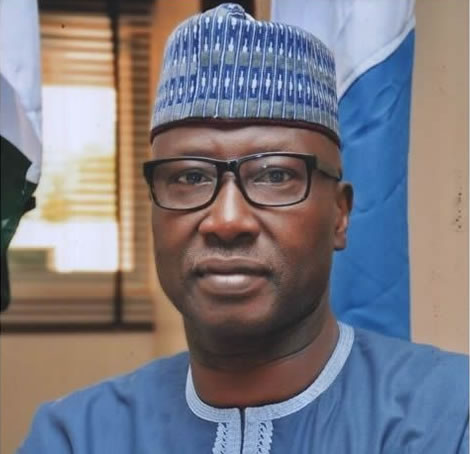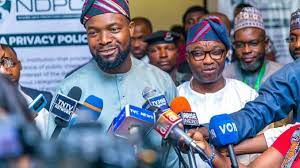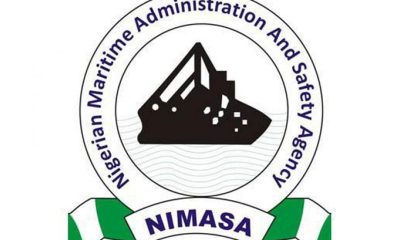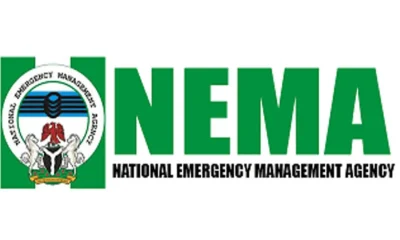Science & Tech
FG Appoints Shaba as DG, Space Development Agency

The Federal Government has appointed Dr. Halilu Shaba Ahmad as the acting Director-General of the National Space Research and Development Agency (NASRDA), following the expiration of the two-term tenure of Professor Seidu Mohammed.
PRNigeria gathered that Dr.
Shaba is one of the most senior directors in the Space Research agency. A graduate of Geography from Bayero University Kano with Masters Degree from Ahmadu Bello University Zaria, he obtained and Ph. D. in Remote Sensing from the Federal University of Technology, Minna in 2000.He started his career as a cartographer at the National Population Commission in 1989, before he returned to the Federal University of Technology, Minna where he was a lecturer and Deputy Dean.
He was also Deputy Director Planning and Research at the National Emergency Management Agency (NEMA) before he was appointed Director of Strategic Space Applications at the National Space Research and Development Agency since 2009 before his current appointment.An expert in Geosciences and Geomatics, specializing in Satellite Remote Sensing and Geographical Information Systems, Dr. Shaba has been a Member of Nigerian Delegation to United Nations Committee on Peaceful Use of Outer Space (UN-COPUOS); Joint Expert Group (JEG8) on the implementation of an integrated AU-EU Joint Strategy under the 8th Partnership on Science, Information Society and Space; Extended Coordinating Team of Global Monitoring of the Environment & Africa (GMES & Africa); and Executive Committee Member & GEO Principal for Nigeria, Group on Earth Observation (GEO), Geneva, Switzerland.
He is also Member of Nigerian Delegation to United Nations Committee on Peaceful Use of Outer Space (UN-COPUOS), Joint Expert Group (JEG8) on the implementation of an integrated AU-EU Joint Strategy under the 8th Partnership on Science, Information Society and Space, Extended Coordinating Team of Global Monitoring of the Environment & Africa (GMES & Africa), and Executive Committee Member & GEO Principal for Nigeria, Group on Earth Observation (GEO), Geneva, Switzerland.
Anambra CP suspends 3 policemen over extortion…2
The visions of Mr. John B. Abang, the new Anambra Police Commissioner, to rid the State of criminal activities and terror gangs may not take long before their fruition. This is because the new CP has since hit the ground running.
In his bid to sanitize the Anambra Police Command and thoroughly reform it, Mr. Abang, has read the riot act to dubious officers and men who are fond of receiving bribes from the public and gratifications before they grant bail to suspects in their custody.
Mr. Abang, upon resuming as CP, warned his men and officers not to extort or collect money before granting bail on bailable offences.
However, three policemen have been arrested and undergoing investigation for extorting money from one Mrs. Love Mbachu and two others.
Responding to the development in a short message to PRNigeria, the police spokesperson in Anambra, Haruna Mohammed said “Following the report that Policemen attached to Ogidi Area Command allegedly extorted the sum of N60,000 from one Mrs. Love Mbachu, the Commissioner of Police, CP John B. Abang, directed Acp X SDQ to investigate and recover the money within 12 hours.
“In compliance with the CP’s directives, the Policemen involved have been arrested and the sum of N60,000 recovered, and handed over to the victims. Meanwhile, all cases are under investigation after which the defaulters would be tried in orderly room.”
The new police boss has paid a familiarization tour to sister security agencies and other critical institutions in the State to solicit their supports and robust partnerships. He has urged the public to forward their complaints to his office for prompt security action on crimnal activities in the state.

Science & Tech
Tinubu @72: Minister Visits Inmates in Kuje Correctional Service

Dr Bosun Tijani, Minister of Communications, Innovation and Digital Economy, on Friday visited the inmates of Nigerian Correctional Service, Kuje to commemorate 72nd birthday of President Bola Tinubu.
The minister, who was represented by his aide, Nafisa Bello, said the visit was to celebrate President’s birthday with inmates by providing them packs of food to put smile on their faces.
Tijani, who wished the President a happy birthday, said the gesture was a way of commending the President’s resilience, pragmatic leadership and commitment to service.
He said even though the president had instructed that no one should organise a birthday party or place any birthday goodwill advertorial messages in newspapers, it was a special day.
“We are here to celebrate President Bola Tinubu’s 72nd birthday and share love with the inmates. We have distributed food packs, we have met and had good conversations with some of them.
“We wish the president a happy birthday, long life and property,” minister said.
One of the inmate, Chiwendu Hart, who spoke on behalf of all the inmates described the gesture as an act of love, adding that they were not in the correctional service for punishment but correction.
He thanked the Federal Government and the correctional officers for rehabilitating and integrating the inmates to come out and live a crime free life.
According to him, the Nigerian Correctional Service has set up degree courses, ran by the National Open University (NOUN) and some skills to keep the inmates busy while undergoing trials.
He said that he had graduated and had a Masters in theology and waiting to enroll for his PhD.
“I am a beneficiary of NOUN, I came here with secondary school certificate but today, I am a graduate and have my Masters in theology.
“Even if after you leave the correctional centre, you can still come back and finish up the courses or the skills you started with.
“Once we leave here, we will go out there and explore what we have learnt in order to live a good life.”
He urged the Federal Government to equip some of the vocational programmes with study materials, tailoring machines, carpentry and shoe making tools.
He wished the President a happy birthday. (NAN)
Science & Tech
NDPC to Sustain Journalists’ Engagement for Better Data Protection Reportage
The Nigeria Data Protection Commission (NDPC) says it will sustain the engagement of journalists for continuous propagation of data privacy and protection message.
The National Commissioner of NDPC, Dr Vincent Olatunji, communicated this when he received officials of the Nigeria Information Technology Reporters Association (NITRA) on Monday in Abuja.
Olatunji recognised that times were changing; hence journalists needed to be abreast with the dynamism in the data privacy and protection ecosystem.
He said the media had remained a great asset towards nation building and continuous engagement would ensure that they played their role maximally.
“We are aware of the freedom of expression granted to you the press by the constitution, but we felt that it is important to train you to understand that part.
“I see this collaboration as a continuous thing, more importantly, now everything is changing, we need to deepen your knowledge on data privacy.
“We cannot do awareness under this building; we need media to assist us to disseminate this information so that people can comply with the data protection policies.’’
He said that the commission was collaborating with relevant institutions in ensuring that data privacy and protection policies were adhered to.
Olatunji said that the commission was working with Committee of Vice Chancellors to further deepen knowledge about data protection.
“We are also working with National Board for Technology Education for Polytechnics and others.
“All these efforts are geared towards ensuring that the message of data protection is spread and there is virtually nothing we can do without you.’’
The national commissioner encouraged NITRA members to pursue training as certified Data Protection Officers, adding that it was a lucrative area with readily available jobs.
According to him, when the training is combined it with knowledge of journalism, there is more advantage more than other data processing officers.
“It is a huge ecosystem that has something for everybody to benefit; so, we need to collaborate and ensure you catch up with the changes in data privacy ecosystem,’’ he said.
Mr Babatunde Bamigboye, Head, Legal, Enforcement and Regulations, NDPC, said many data controllers continuously breached data rights of citizens unknowingly.
Bamigboye, however, said that in spite the need for freedom of speech, there was the place of privacy and rights of the people, which the commission was committed to.
He told the journalists that it was important to learn some emerging ethics that would aid balancing the rights and privacy of individuals while reporting.
President of NITRA, Mr Blessing Olaifa, congratulated Olatunji on the adoption of Nigeria Data Protection Act 2023, adding that it had empowered the commission to enforce data protection in Nigeria.
“We congratulate you on your appointment by the President Bola Tinubu; it is a measure of your hard work and tenacity for the industry growth.
‘We also congratulate you on the passage of the Nigeria Data Protection Act 2023; that has given you the impetus to operate in a way that people are now aware of data.
‘Before now, people were not much familiar and interested in data, some thought it was only data in their phones, but they are aware about information they give about themselves to institutions,’’ she said.
Olaifa, while commending the NDPC on its drive towards engaging the media in its activities, said it was necessary consolidating on the collaboration for more results.
“This is in view of the fact that the sector is dynamic and we need more capacity building to fine-tune our knowledge and upscale our skills while reporting,’’ he said. (NAN
Science & Tech
AU, ALPA Target 3000 Beneficiaries for Hepatitis Treatment in Nasarawa

The African Union, Scientific, Technical and Research Commission (AU-STRC), African Scientific Research and Innovation Council (AU-ASRIC) have partnered with African Liver Patient Association (ALPA) to offer free hepatitis treatment to Nasarawa State indigenes.
The Senior Scientific Officer of AU-STRC, Dr Mohammed Kyari, disclosed this to the News Agency of Nigeria on Wednesday in Model Comprehensive Health Centre, Shabu, Lafia.
Kyari said that the project targeted a total of 3000 persons to benefit from the free hepatitis care, tests and treatment in Shabu, Lafia.
He said the project followed a sensitization and education of communities at all levels including testing which was targeted at the age group 12-80 years old.
Kyari added that the project was a build up from the research conducted by the AU- STRC and ASRIC from 2018 to date with a priority area on “prevention and control of diseases”.
“ The hepatitis testing using the serological rapid diagnostic tests with results in 15 minutes and treatment will commence immediately for positive cases,” he said.
According to him, vaccination will be administered on those that are negative, then further testing will be administered on those tested positive through a viral load confirmation.
Kyari also said that the treatment would focus more on the elimination of mother to child transmission and timely administration of birth dose vaccines for newborns and also by raising awareness.
He added that the project was a pilot phase on the implementation of the ASRIC Flagship Project on Village free of Hepatitis in Nasarawa State, which will hold from the 6th -20th December, 2023.
“ The project is also in line with the implementation of the Science, Technology and Innovation Strategy for Africa (STISA 2024) pillar on building technical and professional competencies.” Kyari said.
NAN monitored events at the Model comprehensive health centre, Shabu, which is the location of the hepatitis free village in Lafia, Nasarawa State and the theme is “ Hepatitis Free Village”..
NAN also reports that there are a total of seven Egyptian doctors on site attending to the residents of Shabu community and about 2500 persons have since benefited from free treatment by receiving free drugs and vaccination.
Among the medical personnel from the Egyptian Liver Research Institute and Hospital (ELRIAH) working on hepatitis eradication in Lafia are Dr. Ahmed Salem, Dr. Ayman Abdelfattah and Prof. Ahmed Farahat (NAN)


























